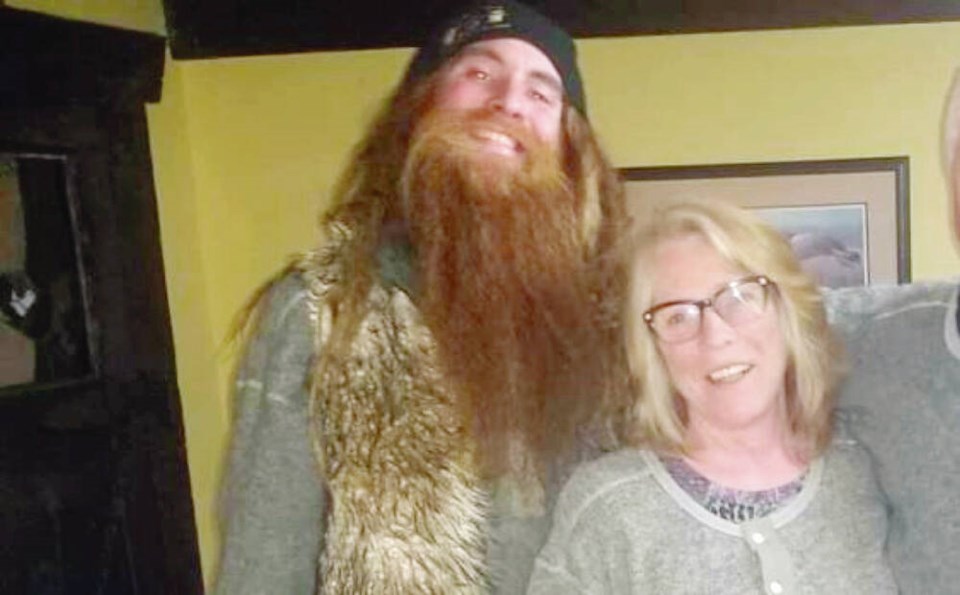A Port Alberni woman accused of murdering her son two years ago had reached her breaking point when she walked downstairs at her home with a loaded, unlocked gun and entered his suite, the Crown has suggested in B.C. Supreme Court.
Samantha Dittmer, 63, is charged with the second-degree murder of Jesse McPhee, who was killed by a single gunshot from a bolt-action .270 Winchester rifle on Aug. 29, 2021.
During a lengthy cross-examination, Crown prosecutor Gordon Baines suggested Dittmer knew more about firearms than she was letting on and had been a good shot as a child.
Dittmer testified that the men in her family hunted for moose, elk and deer. When she was about four or five, she wanted to shoot her father’s hunting rifle. He told her to crouch down and put the butt of the rifle against her right shoulder.
“I pulled the trigger and went over backwards, rolling, rolling, rolling and I was never much interested in trying that again. I didn’t like those big guns,” Dittmer testified.
The jury has heard that McPhee wanted his mother to keep a rifle under her bed for protection. He was concerned that his ex-wife’s boyfriend was going to come to Port Alberni to harm them. McPhee had a number of guns and knives and was preparing for an imminent attack.
Dittmer said she didn’t want the rifle under the bed. McPhee wanted her to use it, but she was having difficulty handling it, she testified.
He told her it wasn’t loaded and she said she believed him.
“You didn’t check, right?” asked Baines.
“I didn’t even want to touch that gun,” said Dittmer.
Checking to see if the rifle was loaded would take less than one second, said Baines.
Dittmer replied that it might take her longer because of her injuries. She also testified that she didn’t know there was a safety on the gun.
“Are you suggesting that the rifle that was stored under your bed for purposes of self-defence was one that you didn’t know how to operate?” asked Baines.
“I don’t ever remember seeing that safety before. And I was not even thinking straight to look for one. I was in a very upset and stressed-out state. I didn’t see one. I didn’t think anyone would have loaded it,” she testified.
“I see all your points here and I agree that of course, under ideal conditions, you would go through all these steps for ultimate best practices for safety. But this was not a normal situation.”
The situation was surreal, bizarre and absurd and Dittmer was terrified, she said.
“But I was ready to try if there was someone coming into that house …. to harm us or kill us, to protect my son I would die trying,” she said.
In 2021, McPhee was going through a divorce, child-care and custody proceedings and a personal-injury claim. There was a civil case over loans and a house in Tsawwassen worth more than $1 million.
Dittmer testified that McPhee had been hit in the head and she believed he had a brain injury. His drinking became a lot worse after the divorce and arson attacks on the Tsawwassen home, she said.
“Would you agree with me that his behaviour was dangerous and unpredictable?” asked Baines.
“It was getting that way since he harmed me that first time on Aug. 1, when he tried to stick his thumbs in my eyes,” she replied.
“You couldn’t trust him?” asked Baines.
“I still trusted his soul. My good son was in there. This strange behaviour that came out would only be there for a short time, then go away and he’d be back to normal,” Dittmer testified, adding that she was nervous and didn’t feel safe.
The jury has heard that on the day McPhee died, Dittmer was under extreme stress and experiencing panic attacks. She felt like she might be having a heart attack. McPhee had threatened her, saying he should just put her out of her misery.
At 3 p.m., he sent a text: “You are mentally ill and I love you. I think you should seek help.”
After that, there were several missed calls between mother and son.
At 6:06 p.m., McPhee phoned Dittmer. The call was answered and lasted 19 seconds.
One minute and 51 seconds later, Dittmer called 911. During that time, she took the rifle, walked downstairs, shot McPhee and walked back upstairs, said the prosecutor.
Dittmer testified that she had not talked to McPhee during that last 19-second phone call.
She said she tried to answer the phone but it fell to the bathroom floor and she thought she heard McPhee apologizing.
“I’m going to suggest to you that you did speak to Mr. McPhee and he said something that provoked you,” Baines said.
“You can suggest that, but it doesn’t make it true,” Dittmer replied.
Dittmer could have called or texted McPhee to see if he had apologized or to see if he was sober before walking downstairs with a gun, said Baines. She could also have called him and asked him to come upstairs and get the gun.
Instead, Dittmer made a decision to handle a firearm in a heightened state of emotion, he said.
She testified she didn’t see any additional danger in bringing her son the rifle.
“I was just giving it back to Jesse. It’s his gun,” said Dittmer.
The jury is set to return to court on Tuesday.



